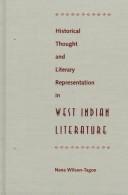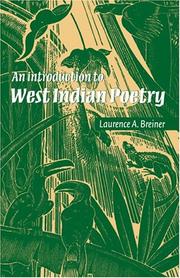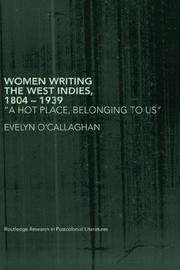| Listing 1 - 10 of 14 | << page >> |
Sort by
|
Book
ISBN: 128218993X 9786612189937 1443804215 9781443803557 1443803553 9781282189935 9781443804219 Year: 2009 Publisher: Newcastle upon Tyne : Cambridge Scholars,
Abstract | Keywords | Export | Availability | Bookmark
 Loading...
Loading...Choose an application
- Reference Manager
- EndNote
- RefWorks (Direct export to RefWorks)
As recently as the early 1970's, scholars were able to argue conclusively for the existence of West Indian poetry as distinct from the English canon. Because much of its development occurred in Britain, hybridising with British practice was inevitable and this book makes a case for a West Indian British poetry which at first parallels and later becomes distinct from either of its parent bodies, relying instead on a cross-cultural aesthetic that continues to evolve. Early chapters examine the...
West Indian poetry (English) --- West Indian poetry --- West Indian literature --- English poetry --- West Indian literature (English) --- History and criticism. --- West Indian authors --- History and criticism
Book
ISBN: 9401211027 9789401211024 9789042038608 9042038608 1322116997 Year: 2014 Publisher: Amsterdam, Netherlands : Rodopi,
Abstract | Keywords | Export | Availability | Bookmark
 Loading...
Loading...Choose an application
- Reference Manager
- EndNote
- RefWorks (Direct export to RefWorks)
The present book offers a reader-theoretical model for approaching anglophone Caribbean women’s writing through affects, emotions, and feelings related to sexuality, a prominent theme in the literary tradition. How does an affective framework help us read this tradition of writing that is so preoccupied with sexual feelings? The novelists discussed in the book – chiefly Erna Brodber, Opal Palmer Adisa, Edwidge Danticat, Shani Mootoo, and Oonya Kempadoo – are representative of various anglophone Caribbean island cultures and English-speaking back¬grounds. The study makes astute use of the theoretical writings of such scholars as Sara Ahmed, Milton J. Bennett, Sue Campbell, Linden Lewis, Evelyn O’Callaghan, Lizabeth Paravisini – Gebert, Lynne Pearce, Elspeth Probyn, Eve Kosofsky Sedgwick, and Rei Terada, as well as the critical writings of Adisa, Brodber, Kempadoo, to shape an individual, focused argument. The works of the creative artists treated, and this volume, hold sexuality and emo¬tions to be vital for meaning-production and knowledge-negotiation across diffe¬rences (be they culturally, geographi¬cally or otherwise marked) that chal¬lenge the postcolonial reading process.
West Indian literature (English) --- Sex in literature. --- English literature --- West Indian literature --- History and criticism. --- Women authors. --- Caribbean literature (English) --- Women authors
Book
ISBN: 0801425751 9781501722936 150172293X 9780801425752 1501722948 Year: 2018 Publisher: Cornell University Press
Abstract | Keywords | Export | Availability | Bookmark
 Loading...
Loading...Choose an application
- Reference Manager
- EndNote
- RefWorks (Direct export to RefWorks)
In Simon Gikandi's view, Caribbean literature and postcolonial literature more generally negotiate an uneasy relationship with the concepts of modernism and modernity-a relationship in which the Caribbean writer, unable to escape a history encoded by Europe, accepts the challenge of rewriting it. Drawing on contemporary deconstructionist theory, Gikandi looks at how such Caribbean writers as George Lamming, Samuel Selvon, Alejo Carpentier, C. L. R. James, Paule Marshall, Merle Hodge, Zee Edgell, and Michelle Cliff have attempted to confront European modernism.
Caribbean fiction (English) --- West Indian fiction (English) --- Modernism (Literature) --- History and criticism. --- Carpentier, Alejo, --- Crepuscolarismo --- Literary movements --- Postmodernism (Literature) --- English fiction --- Caribbean literature (English) --- West Indian literature (English) --- West Indian authors --- Literary studies: c 1900 to c 2000
Book
ISBN: 1441620311 9781441620316 9766402159 9789766402150 Year: 2009 Publisher: Jamaica : University of the West Indies Press,
Abstract | Keywords | Export | Availability | Bookmark
 Loading...
Loading...Choose an application
- Reference Manager
- EndNote
- RefWorks (Direct export to RefWorks)
Earl McKenzie's pioneering philosophical study of the West Indian novel is based on three main assumptions: first, that philosophy is a reflection on the fundamental questions we can ask about ourselves and our world; second, that literature, particularly the novel, is the best method yet devised to provide a "human face" to these reflections; and third, Caribbean philosophy is at present embedded in other forms of cultural expression, like literature, and these forms need to be excavated to reveal what lies within. McKenzie examines ten novels by George Lamming, Roger Mais, Wilson Harris, V.S. Naipaul, Orlando Patterson, Jean Rhys, Erna Brodber, Lakshmi Persaud, Earl Lovelace and Jamaica Kincaid, each selected to represent differences in geography, chronology, ethnicity and gender. In this cross-section of novels, McKenzie identifies ancestral influences from the philosophies of Europe, Africa and India, and shows how West Indian fiction embodies ideas from several areas of philosophy, including metaphysics, epistemology, philosophy of education, social and political philosophy, ethics, feminist philosophy, and philosophy of literature. Philosophy in the West Indian Novel uncovers sections of the mostly unknown Caribbean philosophical mosaic, and McKenzie's work will encourage further study and refection on philosophical ideas in a Caribbean context. It will be of interest to philosophers, literary critics, educators, social scientists, and anyone interested in Caribbean studies.
West Indian fiction (English) --- Philosophy in literature. --- English fiction --- West Indian literature (English) --- History and criticism. --- West Indian authors --- Philosophy in literature --- History and criticism --- Litterature antillaise de langue anglaise --- Philosophie dans la litterature
Book
ISBN: 0813940028 9780813940007 0813940001 9780813940021 9780813940014 081394001X Year: 2017 Publisher: Charlottesville ; London : University of Virginia Press,
Abstract | Keywords | Export | Availability | Bookmark
 Loading...
Loading...Choose an application
- Reference Manager
- EndNote
- RefWorks (Direct export to RefWorks)
"Crossing the Line examines a group of novels by white creoles -- white writers whose identities and perspectives were shaped by their experiences in Britain's Caribbean colonies. Four novels anchor the study: three anonymously published works, Montgomery; or, the West-Indian Adventurer (1812-13), Hamel, the Obeah Man (1827) and Marly; or, A Planter's Life in Jamaica (1828), and E. L. Joseph's Warner Arundell: The Adventures of a Creole (1838). Revealing the contradictions embedded in the texts' constructions of the Caribbean 'realities' they seek to dramatize, Candace Ward shows how these white creole authors gave birth to characters and enlivened settings and situations in ways that shed light on the many sociopolitical fictions that shaped life in the anglophone Atlantic" --
Plantation life in literature. --- Colonies in literature. --- Creoles --- West Indian fiction (English) --- Caribbean fiction (English) --- Racially mixed people --- English fiction --- West Indian literature (English) --- Caribbean literature (English) --- History --- History and criticism. --- West Indian authors --- West Indies --- Caribbean Area --- In literature.

ISBN: 0813024188 9780813024189 9780813015828 0813015820 0813015820 Year: 1998 Publisher: Gainesville : University Press of Florida,
Abstract | Keywords | Export | Availability | Bookmark
 Loading...
Loading...Choose an application
- Reference Manager
- EndNote
- RefWorks (Direct export to RefWorks)
West Indian literature (English) --- Literature and history --- Historiography --- English --- Languages & Literatures --- English Literature --- Historical criticism --- History --- Authorship --- History and literature --- History and poetry --- Poetry and history --- English literature --- West Indian literature --- History and criticism. --- History. --- History and criticism --- Criticism --- West Indies --- Antilles --- Caribbean Islands --- Islands of the Caribbean --- Islands of the Atlantic --- Historiography. --- In literature. --- West Indian literature (French) --- West Indies in literature --- West Indian literature (English) - History and criticism. --- Literature and history - West Indies - History. --- West Indies - Historiography. --- West Indies - In literature.

ISBN: 0521587123 0521583314 0511007418 0511612036 9780511007415 9780521587129 9780521583312 9780511612039 Year: 1998 Publisher: Cambridge : Cambridge University Press,
Abstract | Keywords | Export | Availability | Bookmark
 Loading...
Loading...Choose an application
- Reference Manager
- EndNote
- RefWorks (Direct export to RefWorks)
This introduction to West Indian poetry is written for readers making their first approach to poetry in English written in the Caribbean. It offers a comprehensive literary history from the 1920s to the 1980s, with particular attention to the relationship of West Indian poetry to European, African and American literature. Close readings of individual poems give detailed analysis of social and cultural issues at work in the writing. Laurence Breiner's exposition speaks powerfully about the defining forces in Caribbean culture from colonialism to resistance and decolonization.
Poetry --- American literature --- anno 1900-1999 --- Arts and Humanities --- Language & Linguistics --- West Indian poetry (English) --- History and criticism. --- West Indies --- Intellectual life. --- In literature. --- English poetry --- West Indian literature (English) --- West Indian authors --- Antilles --- Caribbean Islands --- Islands of the Caribbean --- Islands of the Atlantic --- POESIE ANTILLAISE DE LANGUE ANGLAISE --- REGION CARAÏBE --- HISTOIRE ET CRITIQUE --- DANS LA LITTERATURE --- VIE INTELLECTUELLE
Book
ISBN: 0813933943 0813933951 9780813933955 9780813933931 0813933935 9780813933948 Year: 2013 Publisher: Charlottesville : University of Virginia Press,
Abstract | Keywords | Export | Availability | Bookmark
 Loading...
Loading...Choose an application
- Reference Manager
- EndNote
- RefWorks (Direct export to RefWorks)
Modernist techniques not only provided a way for these writers to mark their difference from the aggressively English, literalist aesthetic that dominated postwar literature in London but served as a self-critical medium through which to treat themes of nationalism, cultural inheritance, and identity.
Modernism (Literature) --- Postcolonialism in literature. --- Caribbean fiction --- West Indian fiction (English) --- Caribbean literature --- English fiction --- West Indian literature (English) --- Crepuscolarismo --- Literary movements --- History and criticism. --- West Indian authors --- London (England) --- In literature. --- Littérature postcoloniale. --- Littérature postcoloniale --- Littérature antillaise --- Littérature caribéenne --- Modernisme (littérature) --- Histoire et critique. --- Londres (GB) --- Immigrés
Book
ISBN: 9766376565 9789766376567 9789766375157 9766375151 Year: 2011 Publisher: Kingston ; Miami : Ian Randle Publishers,
Abstract | Keywords | Export | Availability | Bookmark
 Loading...
Loading...Choose an application
- Reference Manager
- EndNote
- RefWorks (Direct export to RefWorks)
West Indian literature (English) --- English literature --- West Indian literature --- History and criticism. --- Lamming, George, --- Criticism and interpretation. --- Political and social views. --- Caribbean Area --- Caribbean Free Trade Association countries --- Caribbean Region --- Caribbean Sea Region --- West Indies Region --- In literature. --- Intellectual life --- Lamming, George (1927-....) --- Critique et interprétation

ISBN: 0415288835 0203633776 1280074043 1134440979 9780203633779 9781134440924 9781134440962 9781134440979 9780415288835 9780415418584 0203638123 0415418585 1134440960 Year: 2004 Publisher: New York : Routledge,
Abstract | Keywords | Export | Availability | Bookmark
 Loading...
Loading...Choose an application
- Reference Manager
- EndNote
- RefWorks (Direct export to RefWorks)
This pioneering study surveys nineteenth- and twentieth-century narratives of the West Indies written by white women, English and Creole. It introduces a fascinating wealth of relatively unknown material and constitutes a timely interrogation of the supposed homogeneity of Caribbean discourse, especially with regard to 'race' and gender.
West Indian literature (English) --- Slavery in literature --- Slavery and slaves in literature --- Slaves in literature --- Sociology of literature --- American literature --- Caribbean Area --- Women --- Women and literature --- Slavery in literature. --- Women in literature. --- Woman (Christian theology) in literature --- Women in drama --- Women in poetry --- Literature --- Human females --- Wimmin --- Woman --- Womon --- Womyn --- Females --- Human beings --- Femininity --- English literature --- West Indian literature --- Women authors --- History and criticism. --- Intellectual life. --- Caribbean area --- Enslaved persons in literature --- CARIBBEAN LITERATURE (ENGLISH) --- CARIBBEAN LITERATURE --- WOMEN AUTHORS
| Listing 1 - 10 of 14 | << page >> |
Sort by
|

 Search
Search Feedback
Feedback About UniCat
About UniCat  Help
Help News
News